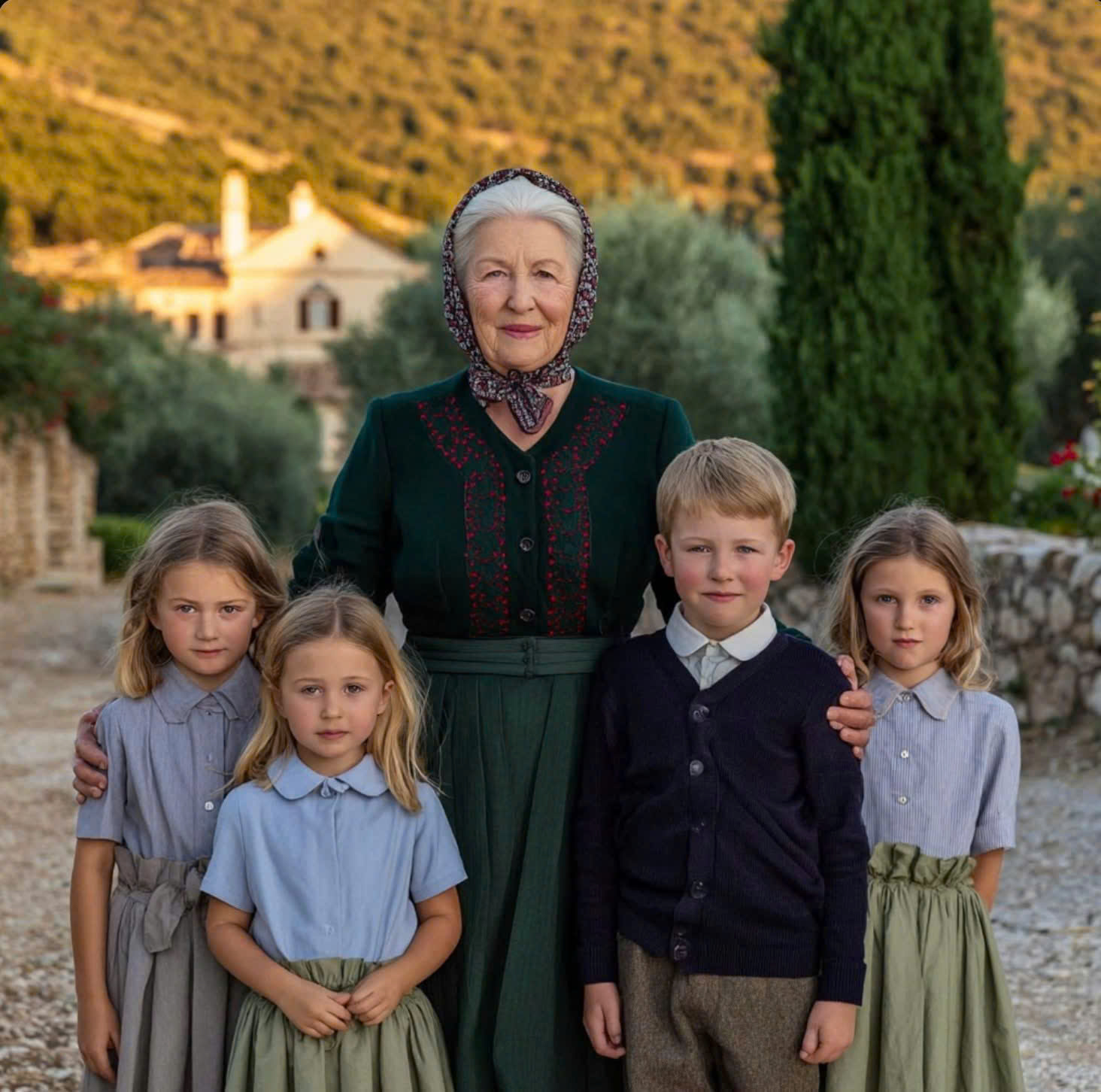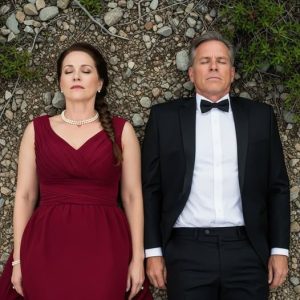My husband walked out for another woman, leaving me with four children and a mountain of debt. And yet, soon after, fate handed me a gift I’d never dared to imagine.
“I can’t live like this anymore, Anya.” Sergey flung the keyring onto the table; flour jumped up in a pale burst and settled like fresh snow.
I froze, dough clinging to my fingers. In the next room the children went silent, as if they could feel a storm rolling in. I tried to steady my breathing even though my heart hammered at my throat. I couldn’t let fear show. Not yet.
“What happened?” I managed. The calm I aimed for cracked at the edges.
He looked through me, not at me. I knew that gaze by now—cool, far away, a practiced mask. I wasn’t a wife to him anymore. Not even a person. Just something in his way.
“That’s it,” he snapped. “This job, this house, debts up to the ceiling—and you, forever with your dough!”
I set the rolling pin down, slow and careful. Wiped my sticky hands on an apron already blotched with jam. It’s strange what becomes sharp in moments like these: every speck of sugar, the curl of the wallpaper pattern, the tiny fold between his brows. Suddenly everything is mercilessly clear.
He poured water from the pitcher and swallowed it in one go. His fingers—smelling of the sawmill—left dirty crescents on the glass. A stray thought flashed by: I’ll be the one scrubbing that off tomorrow.
He went quiet for a long time, then said softly, almost reasonably, “There’s someone else. In the next village. Her name is Marina.”
The air thickened until it felt like I was breathing through wool. My chest caved in on itself.
“We’ve been seeing each other six months,” he went on, eyes fixed on the window. “She’s young. No kids. No debts.”
Each word landed like a blow. Together they spelled the whole verdict: old, with children, with loans—that’s what I’d become to him. He didn’t ask if I loved him. I didn’t even know if I did anymore—maybe we’d been living on habit, not love, for years.
“I’m moving in with her. Tomorrow. My things are packed.”
He nodded toward the hallway. Only then did I notice the big sports bag. How had I missed it? Just as I’d missed everything else—his late nights, the secret messages, the way he’d stopped seeing our kids.
“What about the children? The house? The mortgage is in my name, but we’ve both been paying it…”
“They’ll be fine. You’ll be fine,” he said, like he was repeating a line he’d rehearsed. “You always manage.”
Dasha slipped into the doorway—too thin, too pale, drowning in an oversized T-shirt. Sasha stood just behind her, eyes wide with the kind of knowing no child should carry.
The talk was short and jagged. Sergey didn’t bother cushioning anything. The truth came out raw, like slush after a dirty thaw.
And then he left. No hug. No goodbye. The door slammed, gravel crunched under his steps, and that was that. Just the four of us in a house suddenly packed with debt, loneliness, and questions no one would answer.
For days, Timka kept asking whether Dad was still mad. The littlest didn’t understand. But Mila, a little older, understood immediately: we’d been abandoned.
That night I didn’t sleep. I stared at the ceiling, hollowed out. No tears, no pain, only one pounding question: how?
How do you feed four kids? How do you carry a mortgage signed “for practicality,” before we married—his idea—now tied like a stone to my neck?
Two months dragged by. Sergey didn’t come back. He called once, a week after he left, from an unknown number—to say he wouldn’t collect his things and could only send the minimum child support. Pennies.
The neighbors suggested I sell the house and move in with my mother. But how do five people fit in her one-room apartment? She’s barely getting by on her pension.
Change jobs? To what? My accounting courses are fifteen years old. These days I can calculate diaper packs blindfolded, but not a balance sheet worth hiring.
The bank’s first delinquency notice arrived. At night I lay awake and counted. Counted and counted…
Salary minus medicine. Minus school supplies. Minus utilities.

I looked at Sasha’s drawing again — the crooked chimney, the little tree beside it, a smiling sun peeking from the corner.
He had even drawn all of us standing in front of that house — me, Dasha, Mila, Timka, and himself — holding hands.
No father.
I pressed the paper to my chest, and for the first time since Sergey left, the tears finally came. They burned hot, bitter, unstoppable.
That night, after the children fell asleep, I stood by the window. Snow was falling again — light, hesitant flakes drifting through the streetlight’s glow. Winter was early that year. Everything was cold, inside and out.
But somewhere under all that white silence, a small, stubborn ember began to glow. A whisper that said: You have no one left to wait for. So start walking.
The next morning, I put on my old coat, the one with the missing button, and took the bus to town. I stopped at every shop window with a “Help Wanted” sign. Most turned me away politely, some didn’t bother at all.
Finally, at the last stop, I saw a small bakery — “Dobry Khleb” — Good Bread. The smell reached the street: warm crust, cinnamon, yeast. A world away from my cold kitchen.
Inside, a gray-haired woman was arranging loaves behind the counter.
“Are you hiring?” I asked, my voice too soft even for my own ears.
She looked me over — my tired face, my worn coat — and something in her gaze softened.
“Can you bake?”
I nodded. “Since I was a girl.”
Her lips curved slightly. “We start at six. Come tomorrow.”
It was that simple. A beginning so small it felt almost unreal.
The first weeks were brutal. My hands cracked from kneading, my back screamed, and sometimes I nearly fell asleep on the bus home. But every evening, when I came through the door with a small paper bag of unsold bread — rye, sometimes sweet rolls — the children ran to me like I was bringing treasure.
“Real bread!” Mila would cry. “Not just porridge!”
They ate, laughed, and for a few minutes, the world looked less gray.
Then came the day the bakery owner, Galina Ivanovna, called me into her office.
“I’m opening a small catering branch,” she said. “You’re careful and fast. I need someone to handle the numbers, the invoices, deliveries. You said you studied accounting once?”
I blinked. “Fifteen years ago.”
She smiled. “Then you’ll remember enough. You’ve got the head for it.”
That night I found myself awake again — but this time not from fear. From disbelief. Maybe hope.
By spring, my salary had doubled. I paid off two missed mortgage installments. Mila’s cheeks turned pink again. Dasha began writing stories. Even little Timka started running around the yard, healthy and loud.
Life was still fragile — but no longer sinking.
Then, one afternoon, Galina called me to the back office. “We have a visitor,” she said.
When I stepped in, a tall man stood by the door, wiping snow from his jacket. He wasn’t young — late forties maybe — with eyes like he’d seen his share of winters.
“This is Pavel,” Galina said. “He’s from the city. He’s helping us set up a digital system for orders.”
He extended his hand. “You must be Anya. The one everyone says keeps this place running.”
I laughed awkwardly. “Mostly I just keep it from burning down.”
Over the next few weeks, Pavel came often. He was quiet, kind, always respectful. He noticed things — when the mixer jammed, when my hands shook after a long shift, when Mila’s shoes had worn through and I tried to hide it with tape.
One evening, after closing, he said softly, “You’ve done something impossible here. Most people would have given up.”
“Most days I still want to,” I admitted.
He smiled. “Then maybe that’s what strength really is — wanting to stop, but not stopping.”
Something in me broke open. The part that had gone numb began to stir again.
Months passed. The bakery grew. We started supplying hotels. I got promoted — “financial coordinator,” a fancy title for a woman who once cried over 800 rubles.
And then one morning, a letter arrived. From Sergey.
A short note. No apology. Just a line about how Marina had left him, how he wanted to “see the kids again.”
I read it three times, then set it aside. I didn’t feel anger. Not even relief. Just a deep, calm certainty.
That chapter was over.

I looked at Sasha’s old drawing again — the green-roofed house, the five of us holding hands.
It wasn’t just a dream anymore. It was a plan.
Because somehow, in the ruins of everything Sergey destroyed, life had handed me something back — not a man, not money, but something far rarer.
The gift I’d never dared to imagine: myself.
Ahead—another week, another month, another year.
Minus groceries. Minus electricity. Minus school lunches. Minus pills. Minus the mortgage. Always minus. No matter how I arranged the numbers, they refused to obey.
In the morning, Dasha whispered that Timka had a fever. The flu picked the worst possible moment. We had no medicine left. My card showed 800 rubles. Seven days until payday. An eternity.
Then Mila’s teacher called me aside—soft voice, careful eyes: “Anya, are you sure Mila eats breakfast? She’s faint in class.” My stomach dropped. Mila had been splitting her sandwich with her little brother in silence. I hadn’t noticed. Some mother I was—blind to what mattered most.
That evening I sat at the table with a calculator. I ran the figures again and again. They didn’t just fail to add up; they scattered like cockroaches at the light. Not a single plus. Only minus, minus, minus…
Sasha brought me a drawing: a house with a green roof.
“This is our new home, when we have money,” he said.
I turned away so he wouldn’t see the tears. A new future. What future…?





